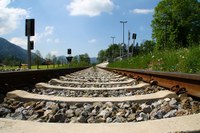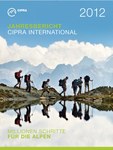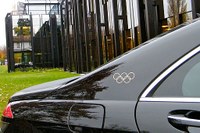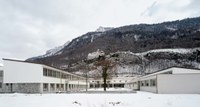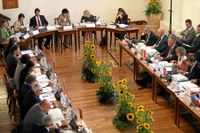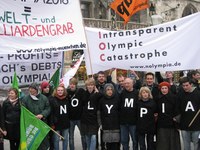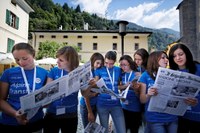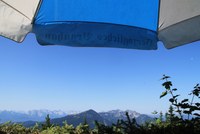Media releases
A new solidarity between the Alpine arc and metropolitan areas
Various political actors in and around the Alps are emphasising a macro-regional strategy for the Alps. CIPRA, the International Commission for the Protection of the Alps, is setting out its role prior to the forthcoming Alpine Conference of environment ministers from the Alpine Convention states, due to be held in Poschiavo, Switzerland in September 2012. CIPRA will take an active part in the process and has responded positively to the Alpine macro-region – provided there is a clear framework. Read More…
An Alpine Crossing Exchange is legally feasible
There are no legal obstacles to the introduction of an Alpine Crossing Exchange (ACE), provided the Alpine countries show the necessary political will. This is the conclusion reached by a study commissioned by the European Region Tyrol - South Tyrol - Trentino. Read More…
CIPRA embarks on a long-distance walk
On 1 January 2014, CIPRA International took over the secretariat of the long-distance trail Via Alpina. Together both alpine-wide networks are working for more sustainable development in the Alps. Passionate hikers shall not be the only ones to benefit. Read More…
CIPRA receives the Dutch Sustainability Award
In an on-line ballot, Dutch mountaineers voted CIPRA the 2012 Sustainability Organisation of the Year. This is the first time the Sustainability Award has been made by the Royal Dutch Mountaineering and Climbing Club. Read More…
Macro-region for the Alps: We are ready!
The EU gave the go-ahead for a macro-region for the Alpine region five weeks ago, but civil society has been left in the dark ever since: national and regional governments are still discussing whether civil society should be permitted to play an active role in the steering group and have again adjourned the debate. NGOs and networks are ready to help build the “House of the Alps” as long as they are given access to the construction site. Read More…
Millions of Steps for the Alps
CIPRA’s networking experience beyond all linguistic, cultural, geographic and political borders has been the key to success on many occasions already. In its latest Annual Report, CIPRA focuses on people who have been working for sustainable development in the Alps since its foundation in 1952. And for the future: CIPRA International has a new Director, namely Claire Simon. Read More…
NGOs and networks for a macro-region Alps and participation of civil society
On 19 December 2013 the European Council will decide whether there should be a European strategy for the Alpine space. States and regions have been working for months on an appropriate proposal – while excluding representatives of civil society. Now the NGOs and networks are presenting a joint paper containing their views. Read More…
NGOs demand participation in the Alpine macro-region
Observer organisations of the Alpine Convention are bewildered at their exclusion from the Alpine macro-region. They are demanding their inclusion in the ongoing process for a macro-regional Alpine strategy. Read More…
Our demand: Olympics-free Alps!
After the celebrations, the hangover of the morning after the Olympics: the reckoning of the consequential damage and the follow-up costs in Sochi. And just as it has been for all the venues around the world that have hosted the Winter Olympics, the reckoning will be severe. In an open letter, CIPRA is calling on IOC President Thomas Bach to initiate a fundamental reform of the IOC. In fact CIPRA has upped the ante with a policy document demanding that no more Winter Olympics be planned or staged in their current form. Read More…
Powering ahead towards carbon-neutral Alps
Emit no more greenhouse gases than the environment is capable of absorbing – that’s the vision the International Commission for the Protection of the Alps (CIPRA) is advocating for sustainable climate protection. In its Annual Report it highlights ways in which the Alps could become carbon-neutral and how people might be motivated to achieve that objective. Read More…
Sustainable building in europe’s mountain municipalities
The house of the 21st century is nice and cool in summer, nice and warm in winter, hardly uses energy and – being built of local wood – stimulates the regional economy. The MountEE project explores ways in which municipalities in Europe’s mountain areas can create such a building culture. Seven partners in European mountain areas – among them CIPRA – work together, learn together and jointly improve their strategies and construction methods. Read More…
Sustainable means a different kind of Olympics
For Switzerland today, a pioneering spirit means effectively reducing one’s carbon footprint. And using one’s own resources in such a way that generations to come are able to go on living a worthwhile life together with the rest of the world. Anything else is a misrepresentation, like the planned Winter Olympics in Graubünden in 2022. Sustainable Winter Olympics need a change of direction, something that the International Olympic Committee (IOC), which dictates the terms, is not even close to initiating. Read More…
The sense and sensuality of contemporary buildings
CIPRA has many years of experience with energy-efficient construction and renovation. It also has many years of experience networking people and publicising information. Which is why it is ideally placed to pass on expertise on contemporary buildings – throughout the Alps and beyond. And that is what CIPRA’s 2010 Annual Report titled Building for the Future is all about. Read More…
Wall blocks centres of six cities
In protest against the fragmentation of habitats in the Alpine space Stop – no way through! Today, 20 October 2010, a giant wall blocks the way of pedestrians in Zurich, Vienna, Munich, Ljubljana and Milan. For animals, it’s the same every day: streets and settlements increasingly fragment their migration routes. Against the background of the 10th Meeting of the Conference of the Parties of the Convention on Biodiversity, now being held in Nagoya, Japan, WWF, CIPRA, ALPARC and ISCAR (the ‘Ecological Continuum Initiative’) demonstrate with ‘The Wall’ how important interlinked habitats are for the survival of many plant and animal species. Read More…
Using less energy is a genuine energy transition
CIPRA, the International Commission for the Protection of the Alps, is demanding a genuine energy transition: using less energy while maintaining the same quality of life. Sustainable building and energy efficiency are therefore clear priorities. The fragile Alpine arc should in future also remain in a state of equilibrium. CIPRA demands that the environment ministers meeting today in Poschiavo, Switzerland, and the Alpine states should also aim for this genuine energy transition. Read More…
What municipalities can do for hermits and fire salamanders
The Alps possess an especially large and valuable diversity of plants and animals; this can only continue if habitats are preserved and remain connected to one another. Municipalities can contribute to this in many ways: CIPRA has produced a short film for municipal representatives showing how to make use of these opportunities. Read More…
Why Sochi is not in the Alps
The 2014 Winter Olympics could have been held in the Alps except that, at the time, Salzburg’s candidacy fell through with the IOC. Nowadays, the Winter Olympics have virtually no chance of success among the people who actually live in the Alps. CIPRA looks back at the experiences gained in recent years. Read More…
Young voices, new perspectives for the Alps
How do things stand with youth participation in the Alps? Where is action needed? A CIPRA report summarises the situation in the Alpine countries and shows the way forward. CIPRA has already taken a first step by creating a youth advisory council. Read More…
Living simply - with fewer resources
(08.04.2014) The Alps are coming under increasing pressure with developments such as the energy transition, the growth of tourism and urban sprawl. But we can offset the limited nature of their natural resources with the help of cultural resources – changing our values to focus more closely on an environmentally-friendly way of life. What this entails is the subject of CIPRA’s 2013 Annual Report. Read More…
